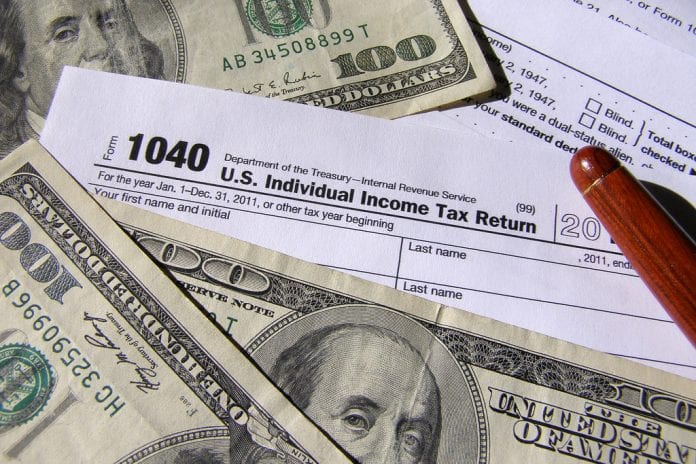A new study by the Washington-based Institute on Taxation and Economic Policy (ITEP) found that undocumented Caribbean and other undocumented immigrants paid US$96.7 billion in federal, state, and local taxes in 2022.
The study finds that most of that amount, US$59.4 billion, was paid to the federal government, while the remaining US$37.3 billion was paid to state and local governments.
The report says that undocumented immigrants paid federal, state, and local tax revenue of US$8,889 per person in 2022.
In other words, for every one million undocumented immigrants who reside in the country, public services receive US$8.9 billion in additional revenue.
“More than a third of the tax dollars paid by undocumented immigrants go toward payroll taxes dedicated to funding programs that these workers are barred from accessing,” it says, stating that undocumented immigrants paid US$25.7 billion in Social Security taxes, US$6.4 billion in Medicare taxes, and US$1.8 billion in unemployment insurance taxes in 2022.
At the state and local levels, the report finds that slightly less than half (46 percent, or US$15.1 billion) of the tax payments made by undocumented immigrants are through sales and excise taxes levied on their purchases.
It says most other payments are made through property tax, such as those levied on homeowners and renters (31 percent, or US$10.4 billion), or through personal and business income tax (21 percent, or US$7.0 billion).
Over $1B in taxes from six states
Six states raised more than US$1 billion each in tax revenue from undocumented immigrants living within their borders. Those states are California (US$8.5 billion), Texas (US$4.9 billion), New York (US$3.1 billion), Florida (US$1.8 billion), Illinois (US$1.5 billion), and New Jersey (US$1.3 billion).
In a large majority of states (40), the report says undocumented immigrants pay higher state and local tax rates than the top 1 percent of households living within their borders.
“Income tax payments by undocumented immigrants are affected by laws that require them to pay more than otherwise similarly situated US citizens,” the report says. “Undocumented immigrants are often barred from receiving meaningful tax credits and sometimes do not claim refunds they are owed due to lack of awareness, concern about their immigration status, or insufficient access to tax preparation assistance.”
Work authorization increases contributions
The report says that providing access to work authorization for undocumented immigrants would increase their tax contributions “both because their wages would rise and because their rates of tax compliance would increase.”
Under a scenario where work authorization is provided to all current undocumented immigrants, the study says their tax contributions would rise by US$40.2 billion per year to US$136.9 billion.
It says most of the new revenue raised in this scenario (US$33.1 billion) would flow to the federal government, while the remainder (US$7.1 billion) would flow to states and localities.
“Debates over immigration policy raise a huge array of issues that are fundamental to life in the US,” ITEP said. “To shed light on just one of those issues, this study undertakes the most thorough examination to date of the federal state, and local tax payments made by undocumented immigrants.”
To accomplish this, ITEP said the study combines “well-established techniques for estimating the size and tax-relevant characteristics of the undocumented population with the trove of data underlying ITEP’s comprehensive studies of US tax incidence.”
“In doing so, it arrives at nationwide estimates of the overall tax contributions of the estimated 10.9 million undocumented immigrants living in the US as of 2022, as well as state-by-state estimates for those immigrants’ payments of state and local taxes,” it added.
The report also forecasts the growth in contributions that would occur under a scenario in which these taxpayers were granted work authorization.
“Like all people living and working in the United States, undocumented immigrants pay sales, excise, property, income, and payroll taxes,” Murad Awawdeh, executive director of the New York Immigration Coalition (NYIC), an umbrella policy and advocacy organization that represents over 200 immigrant and refugee rights groups throughout New York, told the Caribbean Media Corporation (CMC) after the report was issued.
“Despite paying into Social Security, Medicare, and unemployment insurance, they are not able to access those benefits,” Awawdeh lamented. “Granting work authorizations would increase the contributions of New York undocumented immigrants to nearly US$4 billion.”
He also said undocumented Caribbean and other immigrants make up a larger section of the workforce nationally than the native-born population, and that undocumented immigrants make up 4.7 percent of the workforce, “despite making up only 3.4 percent of the total American population.”
ITEP said, “These figures make clear that immigration policy choices have substantial implications for public revenue at all levels of government.”














